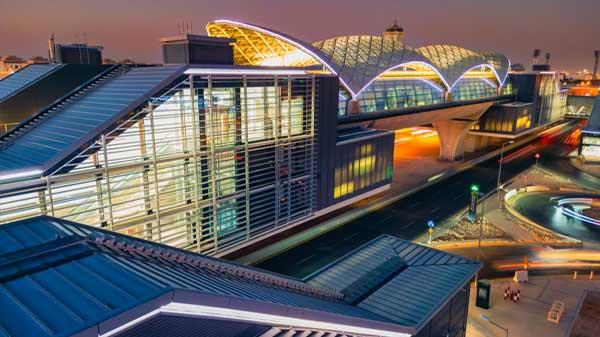Riyadh Metro yellow, green and purple lines (lines 4, 5, 6), built by FCC, officially inaugurated

The Riyadh Metro network, including its yellow, green and purple lines (also known as lines 4, 5 and 6) designed and built by the FAST consortium (led by FCC and with support from Samsung C&T, Alstom, Freyssinet Saudi Arabia, Atkins, Typsa and Setec), was officially inaugurated today.
As the largest construction project ever developed by a Spanish company globally, the Riyadh Metro spans over 176 kilometers across a total of 6 lines, 85 stations and 7 workshops and depots, representing one of the world’s largest urban transport infrastructure projects ever realized.
The metro will operate in phases, with the first three lines – the blue line (line 1), the yellow line (line 4), and the purple line (line 6) – commencing passenger operations on December 1st, followed by the red and green lines (2 and 5) on December 15th and the orange line (line 3) on January 5th.
As a key player in the project, FCC led the design and construction of 3 metro lines, with a total of 29 stations, over 70 kilometres of tracks, 24 viaducts, 28 underground tracks and 13 above-ground tracks. As the backbone of the city’s public transport system, the Riyadh Metro stands as a key milestone of the Kingdom’s ambitious plans to improve mobility and enhance quality of life for all.
The Riyadh Metro network, part of the visionary project for Riyadh Public Transport, was inaugurated by His Majesty King Salman bin Abdulaziz Al Saud on 27 November, representing an important milestone in enabling the realization of the Kingdom’s Vision 2030 goals. This landmark national project reflects the work of the world’s leading design, planning, and construction conglomerates from over 13 countries, joining forces to provide integrated solutions that meet the needs of residents and visitors alike.
Working closely with the local community, FCC ensured best practices in employee health and safety throughout the duration of the project. The implementation of proactive social initiatives, including the Joint Technology Transfer Program, allowed for fruitful exchanges with local universities on health and safety protocols, environmental protection and quality assurance, amongst others. Through workshops, seminars and scholarship programmes aimed at Saudi university students in the Kingdom, over 50 students benefited from the programme over a period of 10 weeks.
Using the latest technological advances in railway systems, FCC successfully contributed to the design and construction of a world-class automated and driverless network at the heart of the Kingdom’s capital city, responding to the current and future needs of residents and visitors alike. Destined to transform urban life in the capital, Riyadh Metro will also enhance the capital city’s mobility ecosystem to address current demands and meet future needs, generating significant economic and sustainability benefits.
Underpinned by 4 iconic stations, which will serve as major hubs in the city's public transport system, the Riyadh Metro network will connect a number of strategic sites, including King Khalid International Airport, King Abdullah Financial District (KAFD), universities, and the downtown area, enhancing access and integration with other transport means such as buses.
Embodying the project’s artistic vision, all stations will offer modern amenities such as internet connectivity, air conditioning, and passenger information systems to enhance the overall experience.
Significant facts about the project
- For the construction of the green line (line 5), the FAST consortium used two TBMs (tunnel boring machines), with a diameter of 9.77 metres, which have enabled full-section tunnels to be excavated, achieving world records for daily excavation progress.
- Among the three consortia (FAST, BACS and ANM) that have participated in the development of the Riyadh metro network, the FAST consortium, led by FCC, was the first to bring a 9.8-metre diameter TBM to Riyadh. Two TBMs were used to bore 10.8 km of tunnels on L5 San'ah and Zafrah, and the first to pass through Salah Al-din station on 4 October 2015, breaking speed records worldwide.
- FCC also led the construction of the viaduct along the Purple Line (line 6) and the airport area using prefabricated beams designed by the company.
- More than 12.2 kilometres of girders were installed over two spans in a record time of 1 year and 9 months, with an average construction and installation rate of 2.5 days/span.
- FCC has duly completed the MEP works along the green and purple lines (lines 5 and 6), with full installations and testing of all fire suppression, HVAC, plumbing, irrigation, fuel oil, electrical, extra low voltage and tunnel management systems. FAST was the first consortium to obtain a station occupancy permit from GDCD (Al Yarmuk station, 6E1 – Purple Line, 20 April 2023).








